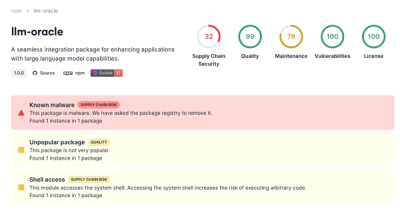
Security News
Dutch National Police Disrupt Redline and Meta Malware Operations
Dutch National Police and FBI dismantle Redline and Meta infostealer malware-as-a-service operations in Operation Magnus, seizing servers and source code.
@graphql-tools/graphql-tag-pluck
Advanced tools
The @graphql-tools/graphql-tag-pluck package is designed to extract GraphQL query strings from JavaScript and TypeScript files. It can pluck GraphQL queries from template literals in your code, which is useful when you want to separate GraphQL operations from the rest of your JavaScript codebase for preprocessing or compilation purposes.
Plucking GraphQL queries from JavaScript/TypeScript files
This feature allows you to extract GraphQL queries from a specified JavaScript or TypeScript file. The `gqlPluckFromFile` function reads the file and returns a promise that resolves with the extracted queries.
const { gqlPluckFromFile } = require('@graphql-tools/graphql-tag-pluck');
async function getQueries() {
const filePath = 'path/to/your/file.js';
const gqlQueries = await gqlPluckFromFile(filePath);
console.log(gqlQueries);
}
getQueries();Plucking GraphQL queries from a string
This feature allows you to extract GraphQL queries from a string containing code. The `gqlPluckFromCodeString` function takes a string as input and returns a promise that resolves with the extracted queries.
const { gqlPluckFromCodeString } = require('@graphql-tools/graphql-tag-pluck');
async function getQueriesFromString(codeString) {
const gqlQueries = await gqlPluckFromCodeString(codeString);
console.log(gqlQueries);
}
const code = "const query = gql`{ user { id } }`";
getQueriesFromString(code);The graphql-tag package is commonly used to parse GraphQL query strings into a standard GraphQL AST. It is similar to @graphql-tools/graphql-tag-pluck in that it deals with GraphQL queries in JavaScript files, but it does not provide the functionality to extract queries from arbitrary code locations.
This package provides a Babel plugin that compiles GraphQL queries using the graphql-tag library at build time. It is similar to @graphql-tools/graphql-tag-pluck in that it processes GraphQL queries in JavaScript files, but it operates as part of the Babel compilation process rather than as a standalone tool for extracting queries.
@graphql-tools/graphql-tag-pluck will take JavaScript code as an input and will pluck all template literals provided to graphql-tag.
Input:
import gql from 'graphql-tag';
const fragment = gql`
fragment Foo on FooType {
id
}
`;
const doc = gql`
query foo {
foo {
...Foo
}
}
${fragment}
`;
Output:
fragment Foo on FooType {
id
}
query foo {
foo {
...Foo
}
}
Originally created because of https://graphql-code-generator.com/.
@graphql-tools/graphql-tag-pluck is installable via NPM (or Yarn):
$ npm install @graphql-tools/graphql-tag-pluck
Once installed you can pluck GraphQL template literals using one of the following methods:
import gqlPluck, { gqlPluckFromFile, gqlPluckFromCodeString } from '@graphql-tools/graphql-tag-pluck';
// Returns promise
gqlPluck.fromFile(filePath, {
useSync: true, // Optional, will return string if so
});
// Returns string
gqlPluck.fromFile.sync(filePath);
// Returns string
gqlPluck.fromCodeString(codeString, {
fileExt: '.ts', // Optional, defaults to '.js'
});
Template literals leaded by magic comments will also be extracted :-)
/* GraphQL */ `
enum MessageTypes {
text
media
draftjs
}
`;
supported file extensions are: .js, .jsx, .ts, .tsx, .flow, .flow.js, .flow.jsx, .graphqls, .graphql, .gqls, .gql.
I recommend you to look at the source code for a clearer understanding of the transformation options.
gqlMagicComment
The magic comment anchor to look for when parsing GraphQL strings. Defaults to graphql, which may be translated into /* GraphQL */ in code.
globalGqlIdentifierName
Allows to use a global identifier instead of a module import.
// `graphql` is a global function
export const usersQuery = graphql`
{
users {
id
name
}
}
`;
modules
An array of packages that are responsible for exporting the GraphQL string parser function. The following modules are supported by default:
{
modules: [
{
// import gql from 'graphql-tag'
name: 'graphql-tag',
},
{
name: 'graphql-tag.macro',
},
{
// import { graphql } from 'gatsby'
name: 'gatsby',
identifier: 'graphql',
},
{
name: 'apollo-server-express',
identifier: 'gql',
},
{
name: 'apollo-server',
identifier: 'gql',
},
{
name: 'react-relay',
identifier: 'graphql',
},
{
name: 'apollo-boost',
identifier: 'gql',
},
{
name: 'apollo-server-koa',
identifier: 'gql',
},
{
name: 'apollo-server-hapi',
identifier: 'gql',
},
{
name: 'apollo-server-fastify',
identifier: 'gql',
},
{
name: ' apollo-server-lambda',
identifier: 'gql',
},
{
name: 'apollo-server-micro',
identifier: 'gql',
},
{
name: 'apollo-server-azure-functions',
identifier: 'gql',
},
{
name: 'apollo-server-cloud-functions',
identifier: 'gql',
},
{
name: 'apollo-server-cloudflare',
identifier: 'gql',
},
];
}
MIT
FAQs
Pluck graphql-tag template literals
The npm package @graphql-tools/graphql-tag-pluck receives a total of 2,981,075 weekly downloads. As such, @graphql-tools/graphql-tag-pluck popularity was classified as popular.
We found that @graphql-tools/graphql-tag-pluck demonstrated a healthy version release cadence and project activity because the last version was released less than a year ago. It has 3 open source maintainers collaborating on the project.
Did you know?

Socket for GitHub automatically highlights issues in each pull request and monitors the health of all your open source dependencies. Discover the contents of your packages and block harmful activity before you install or update your dependencies.

Security News
Dutch National Police and FBI dismantle Redline and Meta infostealer malware-as-a-service operations in Operation Magnus, seizing servers and source code.

Research
Security News
Socket is tracking a new trend where malicious actors are now exploiting the popularity of LLM research to spread malware through seemingly useful open source packages.

Security News
Research
Noxia, a new dark web bulletproof host, offers dirt cheap servers for Python, Node.js, Go, and Rust, enabling cybercriminals to distribute malware and execute supply chain attacks.